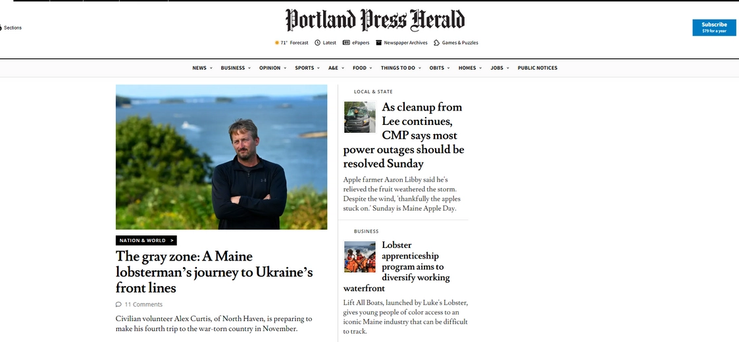The Scoop
Local media in the state of Maine has emerged as an unlikely and asymmetric battlefield for big American political money.
Two of the country’s key left-leaning political spenders, George Soros’s Open Society Foundation and the medical device billionaire philanthropist Hansjörg Wyss, played a central — and previously unreported — role in the nonprofit purchase of nearly two dozen respected local newspapers in Maine, including the Portland Press Herald, the Lewiston Sun Journal and the Kennebec Journal. The July announcement by the National Trust for Local News was greeted with relief by the papers’ management, unionized employees and readers, who had feared a sale to the sort of cost-cutting investors that have scooped up troubled local news organizations.
A person with direct knowledge of the project said that both Open Society and Wyss gave millions to the National Trust for the purchase of the Maine newspapers. A spokesperson for the nonprofit noted that Open Society was one of its financial supporters, but denied that Open Society committed funds specifically for the project.
And the biggest right-wing political money in the country is investing in Maine, too: According to financial filings shared separately with Semafor by the left-leaning group Accountable.US, conservative judicial activist Leonard Leo’s political network has been partially financing a local right-wing publication in Maine.
Launched in 2011, The Maine Wire is a small digital media site that publishes state and national news through a conservative lens, largely serving as a right-wing news aggregator with headlines like “Natural Disaster Threatens Man-Made Disaster as Hurricane Lee Bears Down on Portland’s Growing Homeless Camp” and “Massive Migrant Caravan Heads North to US From Panama.”
According to filings shared with Semafor, in 2020 and 2021, The Maine Wire’s parent organization, the Maine Policy Institute, received funding from several nonprofits backed by Leo, including the Schwab Charitable Fund and DonorsTrust.
The news organization appeared to return the favor with favorable coverage.
Earlier this year, the site published an extensive interview with Leo discussing the current Supreme Court and Trump’s appointment record. Leo praised the outlet’s work, noting that it had “been a privilege to be able to support [the Wire’s] work.” The Wire subsequently bought paid advertisements promoting the article on Facebook, which Accountable.US said was the only time the outlet purchased ads on the social media network in recent years.
“Leonard Leo’s response to the negative press he has rightfully received for being the villain corrupting our courts and pushing an anti-democratic agenda is to funnel dark money to a right-wing propaganda outlet to defend him,” Accountable.US senior advisor Kyle Herrig said in a statement to Semafor.
The Maine Wire has also attempted to play up the political nature of the purchase of the Maine newspaper group. The conservative site covered the purchase of the Maine newspaper group, highlighting the nonprofits’ pre-existing Soros connection and complaining that the papers did not cover an inquiry into whether a state lawmaker was dishonest in financial records.
“The Maine Wire is supported by thousands of Mainers, including Mr. Leo, because they see value in robust investigative reporting into the activities of state and local government,” Maine Wire editor in chief Steven Robinson told Semafor. “Our work speaks for itself.”
In this article:
Max’s view
Maine isn’t a particular target for national politics — simply a microcosm of the broader forces at work in the troubled American local news network. It’s also a microcosm of the deep asymmetry of American news, between a center-left Establishment trying to keep the journalistic lights on and a right-wing media more explicitly focused on politics.
The National Trust’s purchase of the Maine newspapers represent an attempt to preserve existing local news outlets that cover local stories and public figures across the political spectrum. The Leo-backed Maine Wire is a smaller-scale, much more overtly political effort to put a conservative spin on local news in Maine.
It’s impossible to argue against saving local newspapers. But at a time when trust in the news media is at a low, the secrecy around the National Trust’s funding raises questions about the sustainability of a nonprofit model that often depends on relatively few big donors.
Room for Disagreement
“I think the person who writes the checks is ultimately less important than the quality of the news provided,” Michael Socolow, a media historian and journalism professor at the University of Maine, said in an email to Semafor. “Look at the Wall Street Journal: It’s owned by Rupert Murdoch yet its journalists were awarded the Pulitzer Prize in 2019 for revealing Donald Trump’s hush-money payments to Stormy Daniels during the 2016 campaign.”
Notable
- As Semafor first reported last month, the nonprofit Texas Tribune was forced to make major cuts amid a decline in corporate sponsorship revenue, which typically comes from marketing or government affairs budgets. In an email earlier this year to supporters titled “Huge decline in giving,” the newly nonprofit publication the Intercept acknowledged that it had been impacted by a drop in charitable donations over the past year. Multiple nonprofit news insiders have told Semafor over the past several months that the increase in news nonprofits has outpaced giving to these organizations, and has in some cases created competition for a small pool of funds.
- A single, $1.6 billion contribution to groups controlled by Leo represents an “extraordinary sum that could give Republicans and their causes a huge financial boost ahead of the midterms, and for years to come,” The New York Times reported.
- Wyss sought to buy Tribune Publishing, and has channeled vast sums “through a daisy chain of opaque organizations that mask the ultimate recipients of his money,” the Times’s Ken Vogel wrote.


